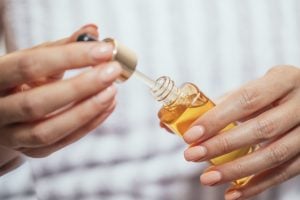What Is Ferulic Acid?
Ferulic acid or hydroxycinnamic acid is a powerful antioxidant that is used in skincare and cosmetic products. As an antioxidant, ferulic acid is used to neutralize free radicals. Free radicals are produced from pollution, UV rays, smoking, diet, and infrared radiation. When there is an imbalance of free radicals in the body it can cause damage to your cells. This damage has been linked to premature aging such as early wrinkles, lines, and loss of firmness.
Ferulic Acid is found naturally in the leaves and seeds of most plants. It is especially high in such foods as rice, wheat, and oats but may also be found in the cell walls of fruits and vegetables such as parsley, spinach, rhubarb, and grapes.
Ingestion of ferulic acid is beneficial to the body because it is an extremely powerful antioxidant. It is these properties that make it helpful in creating anti-aging cosmetics and products.
Ferulic acid and similar compounds, known as hydroxycinnamic acids, are usually found as key ingredients in the best sunscreen for the face. The antioxidant properties help to protect the skin from UVB-induced erythema and absorbs harmful UV rays.

Ferulic Acid
the good: Ferulic acid is an antioxidant that helps to neutralize free radical damage in the skin. This may help to reduce the appearance of premature aging and UV damage. It also has mild protective and reparative abilities against the sun.
the not so good: Ferulic acid needs to be kept in a dark, air-tight bottle so that it does oxidize.
Who is it for? All skin types except those that have an identified allergy to it.
Synergetic ingredients: Works well with most ingredients
Keep an eye on: You will often see ferulic acid in combination with vitamin C and E, so keep an eye out for it in your existing products.
How Does Ferulic Acid Work?
Ferulic acid has been shown to fight the negative effects of various free radicals, including superoxide, nitric oxide, and hydroxyl radicals.
Free radicals may be one of the biggest reasons why people see prematurely aging skin, including under-eye wrinkles and marionette lines. These chemically reactive molecules are a regular part of life but lack of proper protection can make them extremely dangerous and lead to various skin cancers. But to understand why the use of ferulic acid and other antioxidants are valuable for healthy skin, it’s important to first understand how free radicals wreak havoc on your skin.
Firstly, they have been linked to s reduction in collagen, the supportive tissue that keeps skin tight and elastic and may inhibit further growth of this protein. They also diminish the amount of elastin in the skin. Elastin is another protein that allows your skin to stretch back into place without sagging.
Alone, ferulic acid is believed to be more powerful than vitamins C, E, and beta-carotene, and when combined with other powerful antioxidants, the acid is also thought to augment its effectiveness.
How Does Ferulic Acid Benefit The Skin?
As of now, creams, serums, and gels that contain ferulic acid are minimal. They are also on the costly side of beauty products one may readily find in a department store but if you want a serum that has some scientific experiments behind its claims, you want to procure a ferulic acid formula.
The ones readily available are inevitably paired up with vitamins C and E. Combining the three ingredients in a topical solution has proven to be the best formula for anti-aging serums, moisturizing, and sun-blocking formulas. Vitamin C, E, and ferulic acid combinations are especially useful for dry flaky skin on the face.
Ferulic acid is usually combined with vitamins E and C because it helps stabilize them. By stabilizing these vitamins, they become more powerful, protecting the skin against the harmful rays of the sun and stimulating collagen production. This powerful protection can discourage photo-aging, better known as sunspots, and has been linked to protecting against skin cancer.
Vitamin C, E, and ferulic acid combinations may also help to reduce the appearance of uneven skin tones, freckles, sunspots, and other conditions that leave hyperpigmentation on the skin, may benefit from its use. An even skin tone is always a sign of healthy skin.
What Should You Look For In A Ferulic Acid Product?
The first thing to look out for is the packaging. As an antioxidant, ferulic acid needs to be protected from light. This means it should come in a dark-colored bottle.
Make sure to keep it in a cool dry place and keep an eye out for changes in texture and color. The serum will usually change in color and texture if the serum has oxidized or diminished in its effectiveness. If you notice these changes, it might be time to get a new bottle.
Is Ferulic Acid Vegan?
Ferulic acid is considered to be a vegan ingredient as it is derived from plant-based sources such as grains. It can be found naturally in a number of fruits and vegetables as well.
If you are looking for a vegan product, it is always best to check that the brand is also cruelty-free.
Is Ferulic Acid Bad For The Skin?
There are no known side effects to using ferulic acid topically. The only concern you should have is if you are allergic to any kind of grains, such as wheat, barley, or corn, although this risk is generally considered to be minimal.
As with any skincare product, before incorporating creams or serums with this ingredient into your skincare routine, test the product on a small patch of skin first to ensure you are not allergic.
Is Ferulic Acid Safe?
Ferulic acid-containing ingredients have been evaluated by the Cosmetic Ingredient Review Expert Panel. The Cosmetic Ingredient Review Expert Panel is a group responsible for the independent evaluation of the safety and efficacy of skincare and cosmetic ingredients.
The Expert Panel reviewed the available data on ferulic acid-containing ingredients such as honey and cucumbers. There are no issues regarding the safety of ferulic acid.
Is Ferulic Acid Safe For Pregnancy?
Generally, ferulic acid isn’t considered to be safe for pregnancy or breastfeeding. This is because it is considered to be a powerful ingredient. Along with peels and retinol, ferulic acid usually gets put on hold while you grow a baby.
It can be difficult to watch your skin change, become hyperpigmented and see your pores getting larger during pregnancy. While ferulic acid may be off the cards there are a few ingredients that are considered to be useful and safe for pregnancy. Talk to your doctor about vitamin C or alpha-hydroxy acids if you feel you need a little extra help as your body changes during this period.
Make sure to always wear sunscreen, this can help with hyperpigmentation. Sunscreen is not absorbed into the skin, it functions as a barrier to protect the skin.
It is always a good idea to speak to your doctor or specialist before starting new skincare products while you are pregnant.
References:
Srinivasan M, Sudheer AR, Menon VP. Ferulic Acid: therapeutic potential through its antioxidant property. J Clin Biochem Nutr. 2007;40(2):92-100.
Fu-Hsiung Lin, Jing-Yi Lin, Ravindra D. Gupta, Joshua A. Tournas, James A. Burch, M. Angelica Selim, Nancy A. Monteiro-Riviere, James M. Grichnik, Jan Zielinski, Sheldon R. Pinnell, Ferulic Acid Stabilizes a Solution of Vitamins C and E and Doubles its Photoprotection of Skin, Journal of Investigative Dermatology, 2005, 125 (4): 826-832.







